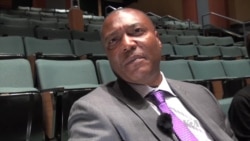Anthony Graves was convicted in 1994 in Texas of murdering a woman, her daughter and her four grandchildren. Later proven to be innocent, Graves spent many years in prison, including 12 years on death row waiting to be executed for a crime he did not commit.
“You took 18 years of my life,” he said, referring to the Texas criminal justice system. “You tried to murder me and I want to stay in your face every day to remind you that we need to do better.”
Graves has used some of the $1.5 million he was awarded by the state of Texas for his wrongful imprisonment to further the cause of reforming the criminal justice system.
There have been 1,700 people exonerated in the United States since 1989, according to the registry kept by Michigan State University Law School.
The Innocence Project, a non-profit group that helps investigate cases in which wrongful conviction is suspected, cites 333 cases since 1989 in which DNA tests resulted in exoneration. The racial breakdown from that figure was 206 African Americans, 101 Caucasians, 24 Latinos and two Asian Americans.
The former Texas death row inmate says many of the problems in the criminal justice system across the United States affect people of all races, especially if they are poor. Graves, who is black, spent more than 18 years in the Texas prison system.
The 49-year-old said inequality is the biggest problem. Poor people, regardless of color, cannot afford the best defense attorneys, he noted, and often are pressured by police and prosecutors to take a plea bargain for a lower sentence rather than face many years in prison.
While this practice reduces the need for full jury trials and is seen by prosecutors as more efficient, it also can result in innocent people with inadequate representation and little knowledge of the legal system pleading guilty to crimes they did not commit.
Graves wants citizens to use their power in the democratic system to seek criminal justice reform.
“We can do it; we have the power to do it,” he said.
Graves travels the country using his own personal story to illustrate what he calls the “injustice of the justice system.”
“I use my story to educate people,” said Graves, “but more importantly, keep it on people’s minds about the injustice that is going on in our criminal justice system.”
The court in Burleson County, Texas convicted Graves in 1994. Six years later, the chief witness against him recanted his testimony. Graves was still in prison, though, when law professor David Dow brought the case to Nicole Casarez, an attorney and professor of journalism at the University of St. Thomas.
“He [Dow] came into class one day and said, ‘Who wants to work on a case that is a death row case, and it has a lot of investigation and a short time fuse,” said Casarez. “And my students and I put up our hands and volunteered and it turned out to be Anthony’s case.”
In 2010, the work done by Casarez, her students and others paid off with the release of Graves from prison and a declaration of his innocence. In June, the State Bar of Texas disbarred the district attorney who prosecuted Graves after its investigation of the case uncovered misconduct.
The problems Graves sees are the same ones cited by many criminal justice experts and law enforcement leaders — including disparities in sentencing between blacks and whites, the imprisonment of people with mental illness or drug addictions, an increase in the number of infractions that can result in someone being jailed and mandatory minimum sentences for some crimes.
Both Graves and Casarez are encouraged by the interest in criminal justice system reform on college campuses and by what appears now to be largely a bipartisan effort. The two major political parties agree on little else these days.
“I think stories like Anthony’s make a big impression on students and it inspires them to go out and vote and try to make a difference,” said Casarez.
For his part, Graves expresses little bitterness about his lost years, saying he is more concerned with the future than the past. Although he came close to be executed for a crime he did not commit, he has not made the death penalty the main focus of his call for reforms.
He and Casarez also spoke of problems with the alternative sentence of life in prison, which excludes any legal representation after it is imposed. They say it also is possible that some innocent people are serving life sentences and have no access to attorneys who could help them appeal their convictions.
Now Graves is applying his singular perspective to help law enforcement get it right when it comes to forensic evidence. He was appointed in June to the board of the Houston Forensic Science Center.





